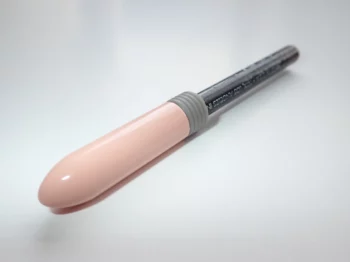By Gary Symons
TLL Editor in Chief
There are plenty of licensing success stories out there, but anyone who’s successfully created a new product knows the road to success is a bumpy one.
That’s especially true of new creators or inventors who come into the business with no existing contacts or experience. For many, the introduction to licensing is daunting, and even trying to get a meeting with a licensing agency or licensee can be a steep hill to climb.
For that reason, we wanted to speak to someone who is at the beginning of that journey, and with luck, we met Brandi Weintraub, a determined inventor looking for a partner for her newly invented cosmetics accessory. Weintraub has developed a new product for the cosmetics industry called the ‘Unicap’; essentially a universal cap that fits onto any makeup pencil.
“I came up with the idea for the Unicap out of necessity,” said Weintraub. “I don’t wear much makeup, but my go-to’s are typically an eyebrow pencil and a lipstick pencil, and I had a lot of pencils that had lost the caps. So I then looked for a replacement and didn’t find one. My other idea was to try to change them for caps that I kept from other pencils, but they were always just a little bit too small or too big.
“I was pretty tired of having to throw out what could have been a perfectly good makeup pencil, so I decided to create a universal cap myself.”

Weintraub since developed a universal cap—appropriately named the Unicap —and has applied for a patent, but the bigger issue right now is trying to find a licensing partner to bring the concept to market.
“When I first started out the initial reaction I was getting was that the product wasn’t really something that they did, but I reached out to pretty much the wrong people for this product, who were all in the fashion cosmetics industry,” Weintraub explained. “Along the way I met this one very nice lady who was not interested in my product at all, but she did tell me was that, as someone who has been in the cosmetic industry for years, she would have no incentive for people to buy my product, because they’re trying to sell more makeup pencils, not fewer of them!”
“She said, I don’t think you should continue to reach out to people who actually do cosmetics, because they have no incentive,” Weintraub added “Their goal is they want you to buy more pencils, because more is obviously better, so she suggested that I reach out to companies that do cosmetic accessories.”
Unfortunately, that also has not yet panned out yet. Weintraub simply has not met the right company that is willing to take a chance on her new invention.
And according to experts, that’s not at all surprising.
A report in the industry journal Tech Crunch by John Hauer, the CEO of Get3DSmart, estimates that only one in 1,500 inventions actually becomes a product in the marketplace.
Other data, from Mintel’s Global New Product Database, indicates that more than 240,000 new products enter the marketplace in 50 countries every year.
On Amazon, the world’s largest ecommerce site, more than 320 million products are vying for the consumers’ attention.
Faced with these kinds of numbers and the complexity of licensing, it makes sense to increase your odds by working with someone who can get a product into the right hands.
And often, that someone is working at a licensing agency!
Weintraub figured that out herself, but again, the numbers work against new inventors. Because so many new products are ideated every year, many licensing agencies are already too busy to take on new clients, even those who are already in the market. Others might be interested, but Weintraub says that, possibly because she’s new and doesn’t yet have a product on the market, the agencies she’s spoken to wanted too much out of the deal.
Inventors are a bit different than brands; they think in terms of licensing one product, not licensing all of their products. Licensing agencies operate in the opposite direction, generally representing a brand that puts out a number of products.
That often results in a disconnect between the parties that makes it hard to build a relationship either is happy with.
“I have spoken to agencies that I thought wanted more than I was offering,” Weintraub explains. “They wanted not only the Unicap, but anything else that I ever produced after that, so if I signed a contract with them even if they didn’t get me a deal, they would have rights to anything else that I did into the future, and so they were more like an agent for a movie star.
“The idea I’d be in the same sort of situation as a movie star going out and doing commercials or films was quite eye opening and something I just wasn’t expecting.”
But that, of course, is the Catch-22 for inventors looking for representation. With so many other inventors looking for deals, agencies are usually faced with more people looking for representation then they can even handle, so they are not typically disposed to one-off product deals.

That said, without an agency, it can be incredibly hard to get the attention of licensees or retailers. Weintraub has been diligent in hitting the phones and contacting companies that seem to be a good fit, but the process in a world where so many products are produced and sold under license makes it even harder to find decision makers.
“CVS, for example, do not in themselves manufacture their products; they have a variety of manufacturers, whether that’s in China, Taiwan, the United States, or they might be in France or Germany,” Weintraub explains. “So they have producers that are placed strategically for the customers that they’re trying to reach, and that has been one of the challenges that I have had is finding the actual manufacturers who see the value and understand how to fit the product into their product line.
“For a new inventor, like myself, I understand, you know, the names that I see on the packaging, but understanding the process of getting it there is a whole world outside of my expertise.”
Even when Weintraub felt she might have found the right type of producer, she faced the daunting task of reaching the right person in that company.
“One of the biggest challenges is reaching the right person,” Weintraub says. “Oftentimes, for someone like myself, my first point of contact is the receptionist, and I know that receptionist is going to send you to sales or send you to marketing and that person may do a quick search and find, oh, okay, well, this person has expertise, and if they don’t, oftentimes they may say, I don’t, I don’t think there’s any value here. Most of my time is actually spent trying to get someone to return the phone call!
“It’s very, very hard to crack the code of figuring out who are the major decision makers, and then actually being able to reach those people. That’s really why I’m exploring all my options, from producing the product and selling it myself, to licensing the product, or even selling the patent.”
After a great deal of time spent looking at all her options, Weintraub is primarily focuses on working with either a licensing agency, or a manufacturer with solid distribution deals who has a focus on cosmetic accessories. Both will involve licensing, and for those who study the work of inventors in the marketplace like John Hauer will tell you the hard work and risk doesn’t stop there, even for good products and concepts.
While inventors who decide to become entrepreneurs face the risk of losing a substantial investment, those going the licensing route also have to realize that they will get a smaller percentage of the profits, should their idea be successful. Licensing fees of 5% to 15% are typical, so a product that sells for $10 and a profit margin of 30%, with a royalty of 10%, would see the inventor earning royalties of 30 cents per sale.
Entrepreneurs who invest in their own product face get a much greater return, but also face a greater risk, as it’s estimated that somewhere between 1-5% of products that launch actually become successful.
The great thing about inventors though, is that the successful ones have never heard the word ‘quit’, and Weintraub is determined to find a home for the Unicap on store shelves.
Anyone interested in learning more about Weintraub and the Unicap can contact her through the Unicap website, at https://www.officialunicap.com
